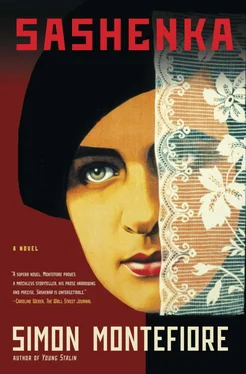Sashenka and the other three girls settled their bottoms on their chairs and straightened their blouses, and arranged their inkwells and blotters once again.
The smoked-glass doors flew open.
“Well, Illich, here’s your new office. Your assistants are all waiting for you, ready to get to work.” Mendel stepped into the room with Comrade Zinoviev, a scruffy Jewish man in a tweed jacket with a frizzy shock of black hair, and Stalin, a small, wiry, mustachioed Georgian wearing a naval jacket and baggy trousers tucked into soft boots.
They stopped at her desk: Zinoviev’s nervous eyes scanned Sashenka’s bosom and skirts while Comrade Stalin, smiling slightly, looked searchingly into her face with eyes the color of speckled honey. Georgians had a charming way of looking at women, she thought.
The men seemed to be borne on a wave of energy and enthusiasm. Zinoviev smelled of cognac; Stalin reeked of tobacco. He was carrying an unlit pipe in his left hand, a burning cigarette in the corner of his mouth. They turned as a short, squat man with a bald bulging forehead, neat reddish beard and a very bourgeois three-piece suit with tie and watch chain burst into the room. In one hand he held a bowler hat and in the other a wad of newspapers and he was talking relentlessly and hoarsely in a well-educated voice.
“Good work, Comrade Mendel,” said Lenin, looking at Sashenka and the others with his twinkling, slanted eyes. “This all looks fine. Where’s my office? Ah yes, through there.” The desk was ready, paper, inkwell and a telephone. “Mendel, which is your niece, the one who studied at the Smolny?”
“That’s me, comrade!” said Sashenka, standing up and almost curtsying. “Comrade Zeitlin.”
“A Bolshevik from the Smolny, eh? Did you really have to bow to the Empress every morning? Well, well, we represent the workers of the world—but we’re not prejudiced against a decent education, are we, comrades?”
Lenin laughed merrily as he headed toward the glass double doors of his office, then turned briskly, smiling no more. “Right, ladies, henceforth you’re working for me. We’re not waiting for power to fall into our laps. We’re going to take power ourselves and smash our enemies into the dust. You’re to be available for work at all times. Often you’ll need to sleep in the office. Make arrangements accordingly. No smoking in this office!”
He pointed at Sashenka. “All right, come on in, Comrade Zeitlin, I shall start with you. I’ve got an article to dictate. Let’s go!”
Dust rose around the limousine as Sashenka watched her husband jump out like a showman from a puff of smoke. The sunlight caught the flash of polished boots, the gleam of an ivory-handled pistol and the scarlet tabs that trimmed the well-pressed blue tunic.
“I’m home,” Vanya Palitsyn called up to her on the veranda, waving at the driver to open the trunk. “Sashenka, bring out the children. Tell them their daddy’s here! I’ve got something for them. And you, darling!”
Sashenka had been lying on a divan on the wooden veranda of their country house, trying to read the proofs of her magazine. The one-story villa with white pillars had been built near Moscow by a Baku oil nabob at the turn of the century. A wave of feathery blossom sailed over her head on the hot wind. The apple and peach trees in the orchard were thick with creamy petals and the veranda smelled of jasmine, hyacinth and honeysuckle. A crackly gramophone recording of Kozlovsky the tenor sang Lensky’s aria from Eugene Onegin over the fence from the neighboring dacha—and a male voice joined in heartily.
She had been out there for a while and found herself humming the aria too. Her son, Carlo, aged three and a half, was on her lap and he did not allow her to read anything because he was so demanding and playful. He was actually named Karlmarx but as he was a toddler during the Spanish Civil War, when Sashenka wore a Spanish beret every day, his name was given a Latin turn. “Carlo, I’ve got to read this. Go and find Snowy and play with her or ask Carolina to cook you something!”
“No,” answered Carlo in his high voice. He was a sturdy, brown-haired boy with a broad dimpled face, already handsome, and was kissing her cheeks. He was built like a bear cub but insisted he was a rabbit. “I want to be with my mama. Look, Mamochka, I’m stroking you!” Sashenka looked down at her son, at his beautiful brown eyes, and kissed him back.
“You’re going to break hearts, Carlo my little bear!” she said.
“I’m not a bear cub, Mama, I’m a bunny rabbit!”
“All right, Tovarish Zayka,” she said. “You’re my favorite Comrade Bunny-Rabbit in the—”
“—whole wide world!” he finished for her. “And you’re my best friend!”
Then she’d heard the car bouncing up the drive.
“Papa’s home!” Sashenka said, sitting up.
“Open the gates!” yelled the driver.
“All right, coming,” she heard a man answer. She recognized his voice. It was one of the service staff, the old Cossack in charge of the horses.
The gates swung open. Through them, she could see the little guardhouse at the end of the communal drive with its figures in blue uniforms. They were not really guarding her house—Vanya was quite important now but some big names, Molotov and Zhdanov, both Politburo members, and Marshal Budyonny and Uncle Mendel, lived down the same lane.
The car, a green ZiS, based on the American Lincoln with a long hood and a sleek body, swung through the gates, its creaky suspension gasping. It threw up clouds of dust as it came, weaving between the chickens, ducks and barking dogs. The children’s pony, tied at the gate, watched impassively.
“Look, Comrade Bunny-Rabbit, it’s Daddy!”
“I only want to kiss Mummy!” insisted Carlo, but he jumped down anyway and rushed to hug his father.
Sashenka followed him down the wooden steps. “Vanya, what a nice surprise! You must be boiling in those boots!” But the wearing of boots at one’s desk, even in high summer—and the Moscow plain was hot that May—was more about the military machismo of the Bolsheviks than comfort or utility. Comrade Stalin wore boots at all times.
Carlo flung himself into Vanya’s arms. His father gathered him up and whirled him round and round. Carlo squeaked with glee.
“How was the parade?” asked Sashenka, watching son and father, who were so alike.
“We missed you on the VIP stand,” replied her husband. “The new planes were beautiful. I saw Mendel—and my new boss with his Georgians. Satinov said he would come by later…”
“Next year I’ll try to organize things better,” she promised. She had given Carolina the morning off to see the parade but the nanny was already back. At first, Sashenka had regretted missing the show in Red Square that demonstrated Soviet power, with its ranks of shock workers, soldiers and athletes in gorgeous uniforms, and its display of planes and tanks. The might of the army filled her with pride at what they had achieved since 1917, and she enjoyed greeting the leaders beside her in the VIP seats. But this year she’d wanted to be home with her children at the dacha.
“Is Uncle Hercules coming for the party?” asked Carlo. “I want to play with him!”
“Papochka says he’s coming but you’ll probably be asleep, Bunny.”
Vanya squeezed Sashenka’s narrow waist and took her face between his huge hands and kissed her.
“You’re so lovely, darling,” he said. “How are you?”
She slipped out of his grasp. “I’m exhausted, Vanya, after the women’s group and the plans for the school and orphanage. There was a problem at the printer’s, some idiotic typographical error—”
Читать дальше












